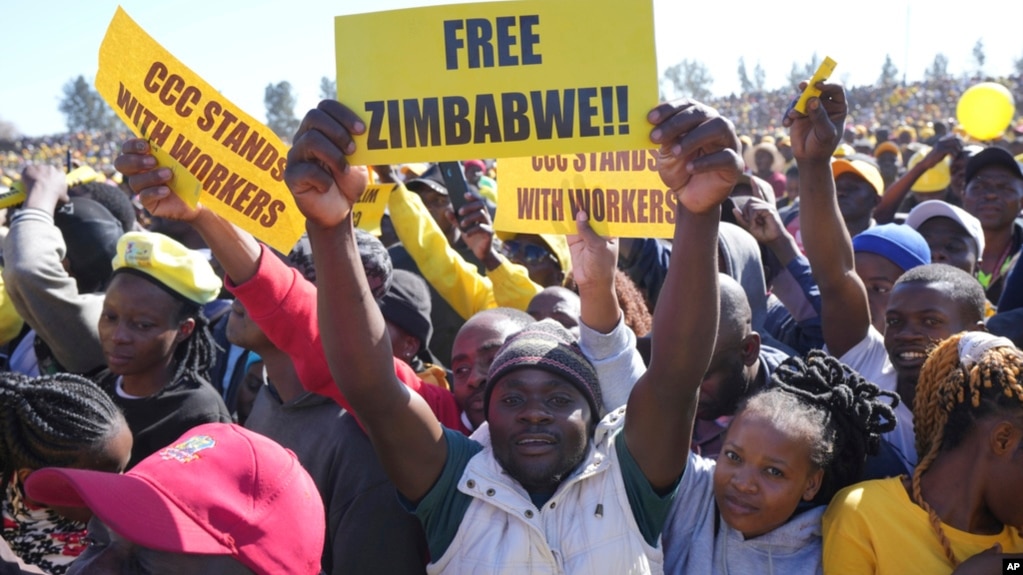
Editor’s note: U.S. Assistant Secretary of State for African Affairs Molly Phee gave an interview to VOA Zimbabwe Service’s Blessing Zulu on Thursday.
U.S. Assistant Secretary of State for African Affairs Molly Phee: I would like to recall that the President of Zimbabwe, President [Emmerson] Mnangagwa, has said repeatedly that he wants his country to hold free and fair elections, and we believe that would be the best path to promote peace and prosperity in Zimbabwe. Unfortunately, we have seen a fact pattern over recent months that suggests that a free and fair election is in doubt, and I can give you some examples of why we are concerned about that possibility.
VOA Blessing Zulu: If you may highlight your concerns.
MP: Well, as you know, last month’s new legislation, called the Patriotic Act, was adopted, and in fact, that legislation imposes restrictions on basic political freedoms agreed in Zimbabwe’s constitution and African Union protocols and in U.N. protocols. Those include freedom of assembly that allows citizens and political parties to meet and prepare to engage in an election process. It also includes restrictions on speech and expression, both by citizens, political parties and journalists. So, those are the types of actions that concern us. We’ve also seen opposition political parties and citizens actively harassed and prevented from exercising their political freedoms, that should be guaranteed by those regimes that I’ve described, the regimes under the Zimbabwean constitution and as expressed by the African Union and the United Nations. So, that’s why we’re concerned that the election won’t achieve the standard highlighted by the president.
VOA: But talking to officials in Harare, they are saying that the U.S. actually has a similar law that penalizes those who commit acts that can be deemed to be treasonous to the state.
MP: I don’t think that’s a fair comparison. We do have legislation that shares the same name, but the content of the law is very different, and I think they may be referring to a different law. In the United States, we take very seriously the freedoms of assembly, the freedoms of expression. We have had our own challenges, as you have seen in recent years in terms of conducting our elections. But we have institutions that are, for example, primarily our judiciary as well as congressional investigative action to check on our own election activities. Because as [U.S.] President [Joe] Biden has said, he believes that democracy is the best form of government to unlock the potential of every human being to treat all equal before the law and to pave the way for stability that allows economic development.
VOA: But is there any communication about these concerns between Harare and Washington?
MP: Yes, we have conveyed those concerns in our discussions with the government. We’ve also talked about them publicly. I would say we have welcomed the invitation of the government for observers to the election. We will be having an observer team from our embassy in Harare and as well it’s my understanding that there’ll be several. International observers, for example the Carter Center from the United States, as well as from the European Union and the African Union. So we hope that those observers are able to conduct their traditional duties to ensure that on the day of the election voters are able to reach the polls freely, they’re not harassed and that the electoral process is conducted in a way that reflects the actual vote.
VOA: Why is it important for Harare to have free and fair elections that are accepted by Zimbabweans and the international community?
MP: Well, again, first a free and fair election is what is expressed in the constitution of Zimbabwe and what has been called for by the president. In our experience in the United States and in our assessment of global experience, the best path for peace and prosperity is through a democratic system that respects all communities in a country, regardless of ethnicity, regardless of religion, regardless of any other category. That everyone is treated equal and allowed to participate freely in defining the future of their country. When you have political stability that results from a system such as I’ve described, then you have an opportunity to have good economic growth. We know and appreciate and respect Zimbabwe’s complicated political history in the 20th century, but we also know that Zimbabwe has a rich history of success, enormous human talent, enormous natural resources. Zimbabwe has the potential to be a great leader in southern Africa and indeed to be a great participant in global conversation. So, that’s what we would like to see for the people and country of Zimbabwe.
VOA: And let’s turn to political violence. An opposition Citizens Coalition for Change supporter was killed in Harare, allegedly by ruling ZANU-PF supporters. What is your take on the issue of political violence?
MP: Well, obviously, I oppose political violence, both in my own country and in Zimbabwe and in any other country. You cannot have a functioning, healthy democracy if people are intimidated by violence. I know we’ve seen examples earlier this year of political parties and citizens exercising their democratic rights being detained, being beaten up by police forces. The example you’ve just described of vigilante forces by the political party, all of that is disturbing and should be unacceptable for a government and a society committed to a true, free and fair election.
VOA: But the ruling party is saying that Mr. Mnangagwa has been calling for peace and nonviolence. Is it not enough?
MP: Well, I think the example you just cited and the examples I have cited suggest that his rhetoric is not yet being translated into action and we would urge the government to follow the rhetoric outlined by the president.


